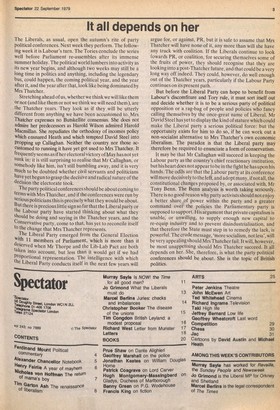It all depends on her
The Liberals, as usual, open the autumn's rite of party political conferences. Next week they perform. The following week it is Labour's turn. The Tories conclude the series well before Parliament re-assembles after its immense summer holiday. The political world lumbers into activity as its new year begins, and although two weeks may still be a long time in politics and anything, including the legendary bus, could happen, the coming political year, and the year after it, and the year after that, look like being dominated by Mrs Thatcher.
Stretching ahead of us, whether we think we will like them or not (and like them or not we think we will need them), are the Thatcher years. They look as if they ,will be utterly different from anything we have been accustomed to., Mrs Thatcher expresses no Butskellite consensus. She does not admire her predecessors as Harold Wilson admired Harold Macmillan. She repudiates the orthodoxy of incomes policy Which ensnared Heath and which tempted David Steel into Propping up Callaghan. Neither the country nor those accustomed to running it have yet got used to Mrs Thatcher. It frequently seems as if her electoral victory of May has not yet sunk in: it is still surprising to realise that Mr Callaghan, or somebody like him, isn't still bumbling away, and it is very much to be doubted whether civil servants and politicians have yet begun to grasp the decisive and radical nature of the decision the electorate took. ■ The party political conferences should be about coming to terms with Mrs Thatcher, and if the conferences were run by serious politicians this is precisely what they would be about. But there is precious little sign so far that the Liberal party or the Labour party have started thinking about what they Should be doing and saying in the Thatcher years, and the Conservative party, come to that, has yet to reconcile itself to the change that Mrs Thatcher represents. The Liberal Party emerged from the General Election With 11 members of Parliament, which is more than it deserved when Mr Thorpe and the Lib-Lab Pact are both taken into account, but less than it would get if we had proportional representation. The intelligence with which the Liberal Party conducts itself in the next few years will argue for, or against, PR, but it is safe to assume that Mrs Thatcher will have none of it, any more than will she have any truck with coalition. If the Liberals continue to look fowards PR, or coalition, for securing themselves some of the fruits of power, they should recognise that they are looking into a post-Thatcher future, and that could be a very long way off indeed. TheY could, however, do well enough out of the Thatcher years, particularly if the Labour Party continues on its present path.
But before the Liberal Party can hope to benefit from Labour's discomfiture and Tory rule, it must sort itself out and decide whether it is to be a serious party of political opposition or a rag-bag of people and policies who fancy calling themselves by the once-great name of Liberal. Mr David Steel has yet to display the kind of stature which could make the Liberal party a serious political force: but the opportunity exists for him to do so, if he can work out a non-socialist alternative to Mrs Thatcher's own economic liberalism. The paradox is that the Liberal party may therefore be required to enunciate a form of conservatism.
It may be that Mr Callaghan will succeed in keeping the Labour party as the country's chief reactionary institution, but his heart does not appear to be in the fight he has upon his hands. The odds are that the Labour party at its conference will move decisively to the left, and adopt many, if not all, the constitutional changes proposed by, or associated with, Mr Tony Benn. The Benn analysis is worth taking seriously. There is no good reason why party activists should not enjoy a better share of power within the party and a greater command meithe poliFies the Parliamentary party is supposed to support. His argument that private capitalism is unable, or unwillipg, to supply enough new capital to re-equip industry and to prevent disindustrialisation, and that therefore the State must step in to remedy the lack, is powerful. The crude message, 'more socialism, not less', will be very appealing should Mrs Thatcher fail. It will, however, be most unappetising should Mrs Thatcher succeed. It all depends on her. She, therefore, is what the party political conferences should be about. She is the topic of British politics.


































 Previous page
Previous page